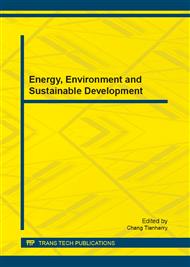[1]
DING Ai-zhong et al. Research Progress on the Arsenic Removal Techniques for Groundwater[J]. Journal of Anhui Agricultural Sciences, 2008, 36(27): 11979-11982.
Google Scholar
[2]
Feng Bingyi. Research on Arsenic Removal Technique for Groundwater[J]. Public Utilities, 2010, 24(1): 21-23.
Google Scholar
[3]
Guo Xianghui. Process and Effect of the Waste Acidic Water Treatment and the Recovery Technology[J]. Tianjin Metallurgy, 2003, 2: 31.
Google Scholar
[4]
BOTHE J V, BROWN P W. Arsenic immobilization by calcium arsenate formation[J]. Environ Sci Technol, 1999, 33(21): 3806-3811.
DOI: 10.1021/es980998m
Google Scholar
[5]
Liu Gang et al. Study on Removal of Arsenic in Drinking Water for Rural Districts[J]. Journal of Beijing Institute of Civil Engineering and Architecture, 2007, 23 (1): 44-48.
Google Scholar
[6]
Jiang Jianhong et al. Treatment of wastewater containing heavy metal from a zinc metallurgy factory[J]. Industrial Water Treatment, 2005, 25(11): 44- 46.
Google Scholar
[7]
ROBINS R G. The solubility of metal arsenies[J]. Metallurgical Transactions B, 1981(12)B: 103-109.
Google Scholar
[8]
Yuan Tao et al. Study on the removal of arsenic from drinking water by coagulants[J]. JOURNAL OF HYGIENE RESEARCH, 1999, 28(6): 331-333.
Google Scholar
[9]
S.R. Wickramasinghe et al. Arsenic removal by coahgulation and filtration: comparison of groundwaters from the United States and Bangladesh[J]. Desalination, 169(2004)231-244.
DOI: 10.1016/s0011-9164(04)00530-2
Google Scholar
[10]
Chen Jingjun et al. Status and Progress of arsenic removal[J]. Jiangxi Chemical Industry, 2004, 2: 1-4.
Google Scholar
[11]
Liu Ruixia et al. Removal of Arsenate by a New Type of Ion Exchange Fiber[J]. Chinese Journal of Enviromental Science, 2002, 23(5): 88-94.
Google Scholar
[12]
Hu Jiaotian et al. Study on Selective Adsorption Removal and Recovery of As(Ⅲ) in Waste Solution Containing As(Ⅲ) with Chelating Resin Containing Mercapto Groups[J]. Journal of Hunan University, 1998, 25(6): 25-28.
Google Scholar
[13]
Véronique Lenoble et al. Dynamic arsenic removal on a MnO2-loaded resin[J]. Journal of Colloid and Interface Science, 280(2004): 62-67.
DOI: 10.1016/j.jcis.2004.07.034
Google Scholar
[14]
Qiu Liping et al. Study on the industrial application of arsenic pollution treatment[J]. Industrial Water Treatment. , 2002,22(9): 29- 31.
Google Scholar
[15]
T. Nishimura,Y. Umetsu. Oxidative precipitation of arsenic(Ⅲ) with manganese(Ⅱ) and iron(Ⅱ) in dilute acidic solution by ozone[J]. Hydrometallurgy, 62(2001): 83-92.
DOI: 10.1016/s0304-386x(01)00188-8
Google Scholar
[16]
Min Shijun. Present Situation and Progress of Technology for Treating As-Containing Industrial Wastewater[J]. Guangdong Trace Elements Science, 2008, 15(8): 1-6.
Google Scholar
[17]
Peng Haiqing et al. Application of Electricity Agglomerate Technology in Water Treatment[J]. Chemical Techno Economics, 2002, 2: 30-33.
Google Scholar
[18]
Liao Min. A Primary Study on Removal of Arsenic in Wastewater by Arsenic-resistant helotism[J]. ENVIRONMENTAL POLLUTION & CONTROL, 1997, 19(2):11-12.
Google Scholar
[19]
KAUSER JAHAN et al. MICROBIAL REMOVAL OF ARSENIC[J]. Water, Air, and Soil Pollution: Focus(2006)6: 71-82.
DOI: 10.1007/s11267-005-9014-1
Google Scholar
[20]
Lester J N. Significance and behavior of heave metals in wastewater treatment process[J]. The science of the tocal environment. 1983, 30: 1-44.
Google Scholar
[21]
Kasan H C. The role of waste activated sludge and bacteria in metal-ion removal from solution[J]. General reviews in Environmental Science and Technology. 1993, 23(1): 79-117.
DOI: 10.1080/10643389309388442
Google Scholar
[22]
Modak J K, Natarajan K A. Biosorpion of metals using nonliving biomass: A review[J]. Minerals and Metallurgical Processing. 1995, 12: 189-196.
Google Scholar
[23]
Lena Q. Ma et al. A Fern that Hyperaccumulates Arsenic A hardy, versatile, fast-growing plant helps to remove arsenic from contaminated soils[J]. World Environment, 2001, 3: 47-48.
Google Scholar
[24]
Wei Zhaoyang et al. Cretan Brake (Pteris cretica L. ): an Arsenic-accumulating Plant[J]. Acta Ecologica Sinica, 2003, 22(5): 777-778.
Google Scholar
[25]
Zhang Yuqin. Study on Removement of Trace Arsenic in Groundwater by Activated Alumina[J]. Environmental Monitoring and Forewarning, , 2010, 2(3): 50-52.
Google Scholar
[26]
Yang Shengke et al. Treatment of water arsenic bearing by modified meerschaum[J]. INDUSTRIAL MINERALS AND POROCESSING, 2000, 10: 13~18.
Google Scholar
[27]
Matthew J. et al. Arsenic removal using a polymeric/inorganic hybrid sorbent[J]. Water Research, 37(2003): 164-176.
DOI: 10.1016/s0043-1354(02)00238-5
Google Scholar
[28]
Yu Zhang, Min Yang, Xia Huang. Arsenic(V)removal with a Ce(IV)-doped iron oxide adsorbent[J]. Chemosphere, 51(2003): 945-952.
DOI: 10.1016/s0045-6535(02)00850-0
Google Scholar


